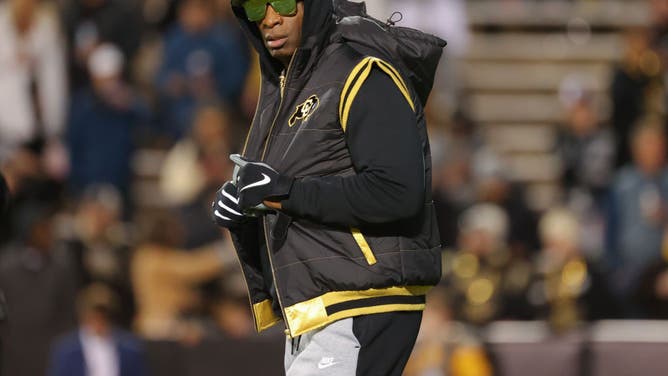Stanford Player Rips Deion Sanders, Says Colorado Football Program Has 'Mercenaries'
Deion Sanders has undeniably improved the Colorado Buffaloes football program in his first year in Boulder. But last Friday's remarkable loss, with Colorado blowing a 29-0 halftime lead to Stanford, has raised some questions in and around the program.
READ: DEION SANDERS SHREDS TEAM IN FURIOUS LOCKER ROOM RANT FOLLOWING STANFORD LOSS
Deion's attention grabbing style and some of his players' trash talking hasn't made the Buffaloes a ton of friends around the Pac-12. And you can add the Stanford football program to the list of critical adversaries.
After the comeback win, Stanford offensive lineman Fisher Anderson posted on X (formerly Twitter) about the differences between the two programs. He specifically called out how the two new coaches approached the players who were there last season.
"A few thoughts on last night: Good always wins out, no matter how bleak it looks," Anderson wrote. "When coach Taylor got hired, he told everyone to stay and believe; Coach prime told everyone to leave. We are program builders; they are mercenaries. I believe in Stanford football; you should too."

BOULDER, COLORADO - OCTOBER 13: Head coach Deion Sanders of the Colorado Buffaloes watches his team during warm-ups before taking on the Stanford Cardinal at Folsom Field on October 13, 2023 in Boulder, Colorado. (Photo by Justin Tafoya/Getty Images)
Downsides To Deion's Strategy Pretty Clear
Calling the Colorado football team "mercenaries" is pretty harsh! But this is what Deion Sanders, the "Coach Prime" nickname and the players' general attitudes leads to when you lose games after being up 29-0.
If you're arrogant in victory, prepare to be humbled in defeat.
Deion wasn't shy about criticizing his team after the historic collapse, saying he felt like they got complacent.
"I talked to them about the old cliche people say — it’s 0-0 but that’s not true. It’s not 0-0, it’s 29-nothing," Sanders said afterward. "I felt complacency going into the half because we stalled offensively, gave up some yardage as well. Just didn’t like how I felt going in at halftime."
That likely had nothing to do with them being "mercenaries," but Anderson has a point that there's a difference between program building and rapid turnover. That said, Sanders didn't have much choice; the Buffaloes' existing roster wasn't likely to improve. And the start of program building happens by changing the culture and outside perspective of the team and its direction.
There's no question Sanders has made improvements there. But if he does really want to build a program, next year may be even more important than this one.